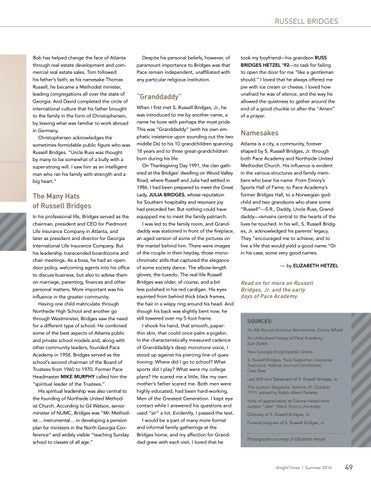RUSSELL BRIDGES
Bob has helped change the face of Atlanta through real estate development and commercial real estate sales. Tom followed his father’s faith; as his namesake Thomas Russell, he became a Methodist minister, leading congregations all over the state of Georgia. And David completed the circle of international culture that his father brought to the family in the form of Christophersen, by leaving what was familiar to work abroad in Germany. Christophersen acknowledges the sometimes-formidable public figure who was Russell Bridges. “Uncle Russ was thought by many to be somewhat of a bully with a super-strong will. I saw him as an intelligent man who ran his family with strength and a big heart.”
The Many Hats of Russell Bridges In his professional life, Bridges served as the chairman, president and CEO for Piedmont Life Insurance Company in Atlanta, and later as president and director for Georgia International Life Insurance Company. But his leadership transcended boardrooms and chair meetings. As a boss, he had an opendoor policy, welcoming agents into his office to discuss business, but also to advise them on marriage, parenting, finances and other personal matters. More important was his influence in the greater community. Having one child matriculate through Northside High School and another go through Westminster, Bridges saw the need for a different type of school. He combined some of the best aspects of Atlanta public and private school models and, along with other community leaders, founded Pace Academy in 1958. Bridges served as the school’s second chairman of the Board of Trustees from 1960 to 1970. Former Pace Headmaster MIKE MURPHY called him the “spiritual leader of the Trustees.” His spiritual leadership was also central to the founding of Northside United Methodist Church. According to Gil Watson, senior minister of NUMC, Bridges was “Mr. Methodist… instrumental… in developing a pension plan for ministers in the North Georgia Conference” and widely visible “teaching Sunday school to classes of all age.”
Despite his personal beliefs, however, of paramount importance to Bridges was that Pace remain independent, unaffiliated with any particular religious institution.
“Granddaddy” When I first met S. Russell Bridges, Jr., he was introduced to me by another name, a name he bore with perhaps the most pride. This was “Granddaddy” (with his own emphatic insistence upon sounding out the two middle Ds) to his 10 grandchildren spanning 18 years and to three great-grandchildren born during his life. On Thanksgiving Day 1991, the clan gathered at the Bridges’ dwelling on Wood Valley Road, where Russell and Julia had settled in 1986. I had been prepared to meet the Great Lady, JULIA BRIDGES, whose reputation for Southern hospitality and resonant joy had preceded her. But nothing could have equipped me to meet the family patriarch. I was led to the family room, and Granddaddy was stationed in front of the fireplace, an aged version of some of the pictures on the mantel behind him. There were images of the couple in their heyday, those monochromatic stills that captured the elegance of some society dance. The elbow-length gloves, the tuxedo. The real-life Russell Bridges was older, of course, and a bit less polished in his red cardigan. His eyes squinted from behind thick black frames, the hair in a wispy ring around his head. And though his back was slightly bent now, he still towered over my 5-foot frame. I shook his hand, that smooth, paperthin skin, that could once palm a pigskin. In the characteristically measured cadence of Granddaddy’s deep monotone voice, I stood up against his piercing line of questioning: Where did I go to school? What sports did I play? What were my college plans? He scared me a little, like my own mother’s father scared me. Both men were highly educated, had been hard-working. Men of the Greatest Generation. I kept eye contact while I answered his questions and used “sir” a lot. Evidently, I passed the test. I would be a part of many more formal and informal family gatherings at the Bridges home, and my affection for Granddad grew with each visit. I loved that he
took my boyfriend—his grandson RUSS BRIDGES HETZEL ’92—to task for failing to open the door for me “like a gentleman should.” I loved that he always offered me pie with ice cream or cheese. I loved how unafraid he was of silence, and the way he allowed the quietness to gather around the end of a good chuckle or after the “Amen” of a prayer.
Namesakes Atlanta is a city, a community, forever shaped by S. Russell Bridges, Jr. through both Pace Academy and Northside United Methodist Church. His influence is evident in the various structures and family members who bear his name. From Emory’s Sports Hall of Fame, to Pace Academy’s former Bridges Hall, to a Norwegian godchild and two grandsons who share some “Russell”—S.R., Daddy, Uncle Russ, Granddaddy—remains central to the hearts of the lives he touched. In his will, S. Russell Bridges, Jr. acknowledged his parents’ legacy. They “encouraged me to achieve, and to live a life that would yield a good name.”Or in his case, some very good names. — by ELIZABETH HETZEL
Read on for more on Russell Bridges, Jr. and the early days of Pace Academy.
SOURCES: An All-’Round Alumnus Remembers, Emory Wheel An Unfinished History of Pace Academy, Suzi Zadeh New Georgia Encyclopedia Online S. Russell Bridges, Pace Supporter, Insurance Executive, Atlanta Journal-Constitution, Cato Bass Last Will and Testament of S. Russell Bridges, Jr. The Lyceum Magazine, Volume 29, October 1919, edited by Ralph Albert Parlette Note of appreciation to Dianne Hetzel from Judson “Jake” Ward, Emory University Obituary of S. Russell Bridges, Jr. Funeral program of S. Russell Bridges, Jr.
Photographs courtesy of Elizabeth Hetzel
KnightTimes | Summer 2016
49
